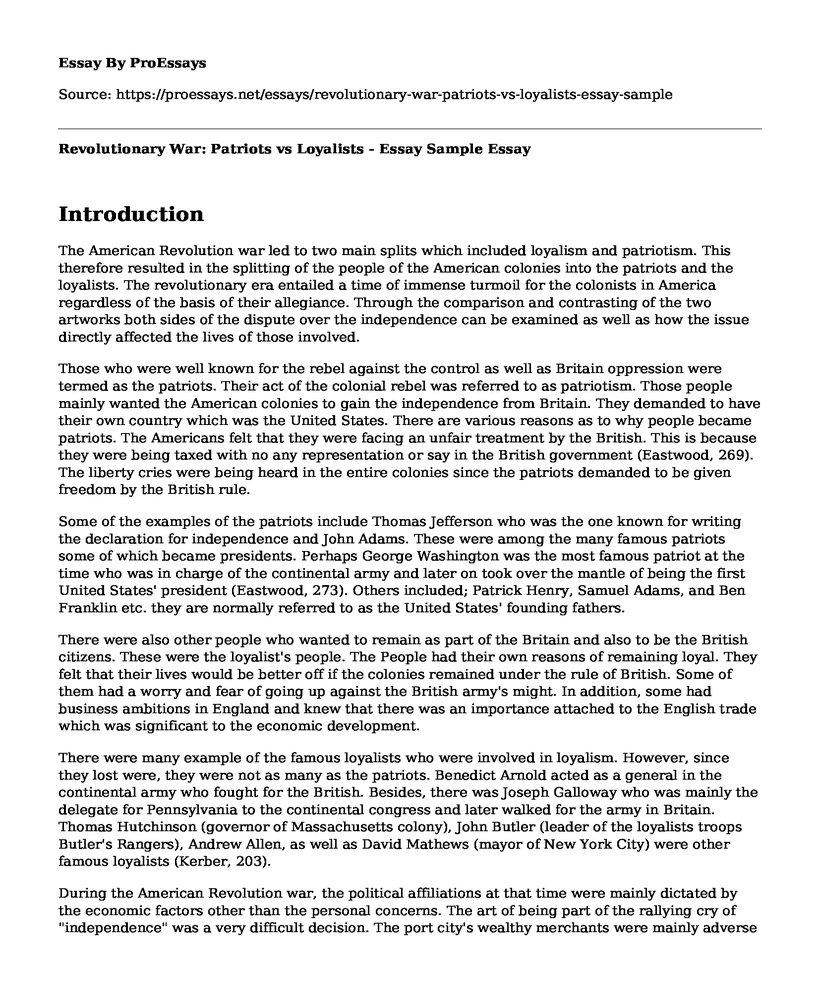Introduction
The American Revolution war led to two main splits which included loyalism and patriotism. This therefore resulted in the splitting of the people of the American colonies into the patriots and the loyalists. The revolutionary era entailed a time of immense turmoil for the colonists in America regardless of the basis of their allegiance. Through the comparison and contrasting of the two artworks both sides of the dispute over the independence can be examined as well as how the issue directly affected the lives of those involved.
Those who were well known for the rebel against the control as well as Britain oppression were termed as the patriots. Their act of the colonial rebel was referred to as patriotism. Those people mainly wanted the American colonies to gain the independence from Britain. They demanded to have their own country which was the United States. There are various reasons as to why people became patriots. The Americans felt that they were facing an unfair treatment by the British. This is because they were being taxed with no any representation or say in the British government (Eastwood, 269). The liberty cries were being heard in the entire colonies since the patriots demanded to be given freedom by the British rule.
Some of the examples of the patriots include Thomas Jefferson who was the one known for writing the declaration for independence and John Adams. These were among the many famous patriots some of which became presidents. Perhaps George Washington was the most famous patriot at the time who was in charge of the continental army and later on took over the mantle of being the first United States' president (Eastwood, 273). Others included; Patrick Henry, Samuel Adams, and Ben Franklin etc. they are normally referred to as the United States' founding fathers.
There were also other people who wanted to remain as part of the Britain and also to be the British citizens. These were the loyalist's people. The People had their own reasons of remaining loyal. They felt that their lives would be better off if the colonies remained under the rule of British. Some of them had a worry and fear of going up against the British army's might. In addition, some had business ambitions in England and knew that there was an importance attached to the English trade which was significant to the economic development.
There were many example of the famous loyalists who were involved in loyalism. However, since they lost were, they were not as many as the patriots. Benedict Arnold acted as a general in the continental army who fought for the British. Besides, there was Joseph Galloway who was mainly the delegate for Pennsylvania to the continental congress and later walked for the army in Britain. Thomas Hutchinson (governor of Massachusetts colony), John Butler (leader of the loyalists troops Butler's Rangers), Andrew Allen, as well as David Mathews (mayor of New York City) were other famous loyalists (Kerber, 203).
During the American Revolution war, the political affiliations at that time were mainly dictated by the economic factors other than the personal concerns. The art of being part of the rallying cry of "independence" was a very difficult decision. The port city's wealthy merchants were mainly adverse to the independence as it would have a blow to their business. Those in the exporting and importing business like Robert Hooper relied mainly on the partnership trade with the England. "The Hooper family owned the largest and most profitable shipping business in Marblehead, Massachusetts, and therefore had a considerable amount of social and political influence" (Mori, 39). Therefore, the painters that were commissioned for the painting of the various portraits had a common political sympathies of many of their sitters like John Singleton Copley, a family friend of Robert Hooper's, was a vocal Loyalist who was forced to flee to England to escape persecution for his political beliefs while Charles Wilson Peale was an ardent Patriot as well as a member of the Sons of Liberty
References
Mori, Jennifer. "Languages of Loyalism: Patriotism, Nationhood and the State in the 1790s." The English Historical Review 118.475 (2003): 33-58.
Eastwood, David. "Robert Southey and the meanings of patriotism." Journal of British Studies 31.3 (1992): 265-287.
Kerber, Linda K. Women of the republic: Intellect and ideology in revolutionary America. UNC Press Books, 2000.
Cite this page
Revolutionary War: Patriots vs Loyalists - Essay Sample. (2023, Feb 13). Retrieved from https://proessays.net/essays/revolutionary-war-patriots-vs-loyalists-essay-sample
If you are the original author of this essay and no longer wish to have it published on the ProEssays website, please click below to request its removal:
- The Liberty Party - Paper Example
- The Battle of Gettysburg Essay Example
- African American Inventors Annotated Bibliography
- John Fitzgerald Kennedy's Presidency Essay Example
- Paper Example on John Conrad: From Congo to Victorian Scholar
- Essay Sample on Odinga: Legendary Hero of Siaya Kingdom, Son of God Jaramogi
- Essay Example on The Dalai Lama: Icon of Buddhism, Leader of Activism







